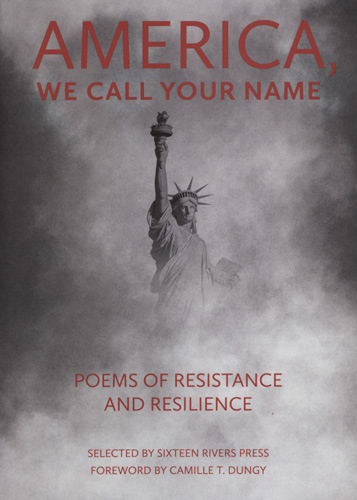America, We Call Your Name
I love anthologies. Where else can you read so many diverse, creative ideas linked to a theme and compiled in one electrifying place? In the introduction to the anthology, America, We Call Your Name: Poems of Resistance and Resilience, Murray Silverstein asks, “With our common culture so fractured, what did poetry have to say?” The answers here are emotional and right on target.
I love anthologies. Where else can you read so many diverse, creative ideas linked to a theme and compiled in one electrifying place? In the introduction to the anthology, America, We Call Your Name: Poems of Resistance and Resilience, Murray Silverstein asks, “With our common culture so fractured, what did poetry have to say?” The answers here are emotional and right on target.
David Beckman gets us started and strikes a common chord with “my soon-to-be written protest poem.” He outlines his journey from reluctance to involvement, saying he: “will put life on the line against fascism and all its kin.”
Mona Nicole Sfeir titles her intriguing poem simply “Z,” referring to the military term Zone of Fire. In it she writes:
Who cares when you can barely recall
what truth tastes like on the tip of your outstretched tongue.
The sky is falling from behind the stars nailed to the flag.
Along with today’s poets, the editors have wisely chosen to refresh our memories with a hefty selection of poetry by writers who made their words felt in past centuries. As an example, most people identify the words “Give me your tired, your poor, [ . . . ]” with the Statue of Liberty. But less familiar are the spirited lines by Emma Lazarus that precede those famous words from her 1883 poem, “The New Colossus”:
From her beacon-hand
Glows world-wide welcome; [ . . . ]
“Keep, ancient lands, your storied pomp!” cries she
With silent lips.
And how about this from Tang Dynasty Chinese poet Po Chü-i who lived from 772 to 846? His poem, “On Setting a Migrant Goose Free,” is translated by David Hinton:
Once a man of the north, I’m accused and exiled here.
[ . . . ]Goose, o soaring
goose, rising into clouds—where will you fly now?
Don’t fly northwest, that’s the last place you should go.[ . . . ]
those soldiers. They’d shoot you down and have a feast
then pluck your wings clean to feather their arrows.
Back to modernity, two poems illustrate how today’s young people feel about the world they’re inheriting. High school senior Grace McNally spins on Sophocles with “Antigone Marches on Washington”:
She does not need another blind follower of the figurehead blinded by hate.
She does not need another bigot to discredit the truth of prophets and the past.
[ . . . ]
For justice must come in the end, not from hands of gods, but from you.
Students need teachers, of course, and Rick Barot writes as a teacher speaking to his class in “Coast Starlite,” “The mind going / over and over things, not knowing what to do / with the world but to turn it into something else.”
One of my all-time favorite poets and a contributor to this book is Lisel Mueller, who fled Nazi Germany with her family when she was 15 years old. Her poem, “The Laughter of Women,” was written a couple decades ago , but it couldn’t be more timely for today:
The laughter of women sets fire
to the Halls of Injustice
and the false evidence burns
to a beautiful white lightnessIt rattles the Chambers of Congress
and forces the windows wide open
so the fatuous speeches can fly out
Adding to the diversity of voices and settings, Lucille Lang Day picks a cruise ship as the venue for her piece, “Inauguration Day in the Galápagos.” She deftly echoes what thousands of landlocked TV viewers may have also felt by pointing out:
a man had threatened to jump overboard
if they showed the inauguration again,
so they waited until he was safe on Plaza Sur
surrounded by iguanas
Elsewhere, some of the titles alone speak volumes, such as Martin Ott’s “Why We Believe Obvious Untruths,” Michael Benedikt’s “The Thermometer and the Future,” the anonymously written “That Damned Fence,” which was originally circulated in the Japanese-American Internment Camp in Arizona during WWII, and Terrance Hayes’s “American Sonnet for My Past and Future Assassin.”
America, We Call Your Name: Poems of Resistance and Resilience should be widely read for unique exposures to a far-reaching circle of viewpoints. It may lead to a further understanding of conditions and events that affect all people today. It may also bring an appreciation of how previous eras struggled with alarming conditions and events that eventually brought us to where we are in 2019.





